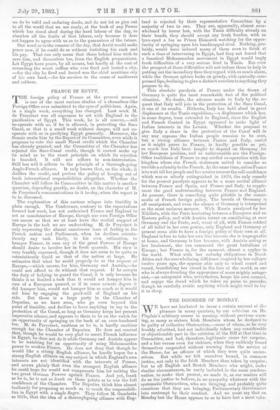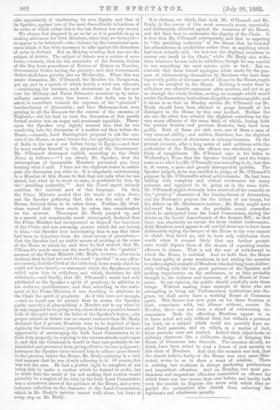THE DISORDER OF MONDAY.
WE have not hesitated to incur a certain amount of dis- pleasure in many quarters, by our criticism on -Mr. Playfair's arbitrary course in naming, without previous warn- ing, as many as sixteen Irish Members whom he declered to be guilty of collective Obstruction,—some of whom, as he very frankly admitted, had not individually taken any considerable or objectionable part in the criticism of the Bill at that time in Committee, and had, therefore, legitimate cause for surprise, and a fair excuse even for violence, when they suddenly found themselves suspended without warning from the service of the House, for an offence of which they were quite uncon- scious. But while we felt ourselves bound, in common justice, not only to the Irish Members thus taken 'by surprise, but to all English and Scotch Members who might, under similar circumstances, be easily included in the same condem- nation, to make that protest, we made it, as our readers will do us the justice to believe, in no sympathy whatever with the systematic Obstructives, who are bringing, and probably quite conscious that they are bringing, Parliamentary Government into contempt by their conduct. And we must say that on Monday last the House appears to us to have lost a most vale-
able opportunity of vindicating its own dignity and that of its Speaker, against two of the most discreditable infractions of its order of which either this or the last Session has any record.
We always feel disposed to go as far as it is possible to go in making allowance for Irish Members, when they are betrayed— or appear to be betrayed—into violence by the exceptional mea- sures which it has been necessary to take against the disturbers of order in Ireland. But on Monday evening that was not the subject of debate. The subject of debate was a matter of mere form,—namely, that for the remainder of the Session, Orders of the Day have precedence of Notices of Motion on Tuesday, Government Orders having the priority ; and that Government Orders shall have priority also on Wednesday. When this was under discussion, Mr. O'Donnell, the Member for Dungarvan, got up, and in a speech of which hardly a word was relevant, —containing, for instance, such statements as that the new vote for Military and Naval Estimates mounted up by extra- ordinary amounts every two hours ; that India was to be asked to contribute towards the expenses of the " piratical " bombardment of Alexandria ; and that Mahommedans were praying in all the Mosques for the success of the enemies of England,—did his beat to turn the discussion of this purely formal matter into an angry and passionate squabble. There- upon the Speaker very rightly warned him that he was wandering into the discussion of a motion not then before the House,—namely, Lord Hartington's proposal to ask the con- sent of the House, on some future day, for applying the revenues of India to the use of our Indian troops iii Egypt,—and. that he must confine himself to the proposal of the Government. Mr. O'Donnell thereupon replied, according to the Daily News, as follows I am afraid, Mr. Speaker, that the interruptions of honourable Members prevented you from hearing what I said. I have not the slightest desire to antici- pate the discussion you refer to. It is singularly embarrassing to a Member of this House to find that not only what he has stated, hut what he is about to state, is predicted for him by the presiding authority.'" And the Times' report entirely confirms the insolent part of this language. On this, the Prime Minister moved that the words be taken down, and the Speaker gathering that this was the wish of the House, directed them to be taken down. Further, Mr. Glad- stone moved that these words be taken into consideration on the morrow. Thereupon Mr. Healy jumped up, and in a speech not unnaturally much interrupted, declared that the Prime Minister had incorporated in himself the functions
• of the Chair, and was assuming powers which did not belong to him,—tlie Speaker here interrupting him to say that there had been no departure from the usual course of procedure,— that the Speaker had no visible means of arriving at the sense of the House at which he said that he had arrived, that Mr. O'Donnell's words were not the words given in the " garbled " account of the Prime Minister (Mr. Healy, however, afterwards declared that he had not used the word " garbled" in any offen- sive sense), that the Clerk at the table took down words which he could not have heard,--a statement which the Speaker at once called upon him to withdraw, and which, therefore, he did withdraw,—and finally, that Mr. O'Donnell's words had only attributed to the Speaker a spirit of prophecy, in addition to his ordinary qualifications ; and that, according to the state- ment of the Prime Minister, it was insulting to attribute to the Chair the spirit of prophecy. As if this were not enough, —and no insult can be greater than to accuse the Speaker (quite untruly) of admonishing a Member not to say what he is only supposed to be going to say, since that is a positive breach both of the spirit and of the letter of the Speaker's duties,—the proper subject in debate was no sooner resumed than Mr. Healy declared that if private Members were to be deprived of their rights by the Government procedure, he himself should have no opportunity of encouraging the Irish Land Commission to do their duty properly, by replying to the various attacks made upon it, and that the Commission would in that case probably be in- timidated and prevented from giving effect to its true judgment ; hereupon the Speaker twice warned him to adhere more closely to the question before the House, Mr. Healy rejoining in a very curt manner that he was closely adhering to it. Of course, this was not the case. He had a perfect right to complain of not being able to make a motion which he desired to make, but to insist that the result of his not making that motion would probably be a neglect of its duty by the Irish Land Commission was a monstrous abuse of the patience of the House, and a very indecent reflection on the character of the Land Commission, which in Mr. Healy's opinion cannot walk alone, but leans at every step on Mr. Healy.
It is obvious, we think, that both Mr. O'Donnell and Mr. Healy, in the course of this most unseemly scene, repeatedly and deliberately offended against the decencies of the House, and did their best to undermine the dignity of the Chair. It is true that Mr. O'Donnell subsequently said that in imputing to "the presiding authority" of the House that he founded his admonitions on predictions rather than on anything which had been actually said, "he had not the slightest intention to convey any insult to the Chair," while Mr. Healy also with- drew whatever he was told to withdraw, though he was careful to say something the next minute quite as bad. But we contend that these forced apologies, when made for the pur- pose of whitewashing themselves by Members who have been repeatedly guilty of the same sort of offence in the House, ought not to be accepted by the House. Nothing is easier than to withdraw one offensive expression after another, and yet to go on through the whole Session, setting an example which would render Parliamentary institutions altogether unmanageable ; and it seems to us that on Monday neither Mr. O'Donnell nor Mr. Healy should have been allowed to purge himself of his disrespect to the House by this easy method. Neither the one nor the other has evinced the slightest contrition for the very many offences of the same kind, of which, during both the present Session and previous Sessions, they have been guilty. Both of them are able men, one of them a man of very unusual ability; and neither, therefore, has the slightest excuse on the score of obtuseness or misapprehension. On the present occasion, after a long series of such collisions with the authorities of the House, the offence was absolutely a super- fluity of naughtiness. Mr. O'Donnel 'says in his letter to Wednesday's Times that the Speaker himself used the future tense as to what he (Mr. O'Donnell) was intending to do; but this is, of course, a mere and grossly disrespectful quibble. The Speaker judged, as he was entitled to judge, of Mr. O'Donnell's purpose by Mr. O'Donnell's actual achievenaents. He had been talking with complete and violent irrelevance for many minutes, and appeared to be going on in the same style. Mr. O'Donnell might obviously have reserved all his remarks on the "piratical" character of the bombardment of Alexandria, and the Moslemite prayers for the failure of our troops, for the debate on Mr. Gladstone's motion ; Mr, Healy might have delivered his homily on the probable moral cowardice which he anticipated from the Land Commission, during the debate on the Lords' Amendments of the Arrears Bill ; so that there was absolutely no excuse for these violent irrelevancies. Both Members must appear to all careful observers to have been deliberately trying the temper of the House to the very utmost to which they dared go, and to have only withdrawn their words when it seemed likely that any further persist- ence would deprive them of the chance of repeating similar offences in future. That is not the sort of withdrawal to which the House is entitled. And we hold that the House has been guilty of gross weakness, in not seizing the occasion to make a signal example of Members who had long been deliber- ately trifling with the too great patience of the Speaker, and making experiments on the endurance, or as they probably thought it, the dullness and tameness, of the House of Com- mons. In our opinion, the public should carefully note these things. Without making some example of those who are attempting to bring ottr Parliamentary institutions into dis- grace, we shall never have a working House of Commons again. This licence has now gone on for three Sessions at least, sometimes with, but oftener without, excuse. On Monday, there was not even a shred of extenuating cir- cumstance. Both the offending Members appear to us to have acted not only without heat, but without a pretence for heat, on a subject which could not possibly have ex- cited their passions, and on which, as a matter of fact, those passions were not excited. Indeed their object looks to ordinary observers like a deliberate design of bringing the House of Commons into discredit. The occasion should, we think, have been seized to read a lesson of just severity to this class of Members. And that the occasion was lost, that the almost infinite lenity of the House was once more illus- trated, seems to us to show a want of wisdom. There is nothing but weakness in always pardoning pertinacious and impenitent offenders. And on Monday, two most per- tinacious and impenitent offenders committed an offence for which there was less excuse than ever before, and hardly took even the trouble to disguise the scorn with which they re- garded the authorities who shrank from enforcing the legitimate and. wholesome penalty.



































 Previous page
Previous page